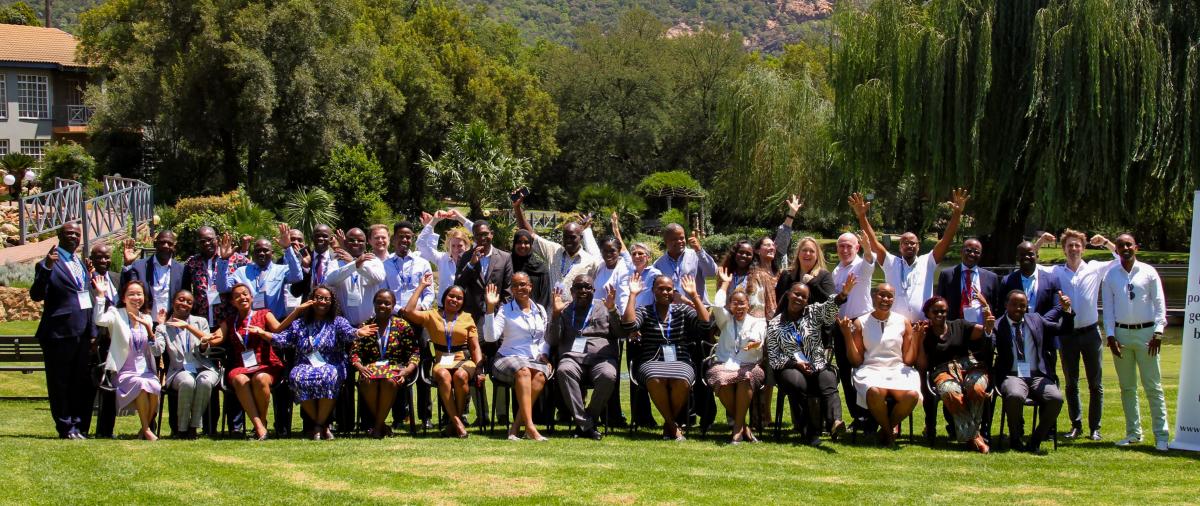Incubating Innovation and Catalyzing Action: The Power of DRF Training

Learning events provide many benefits to both the participants and organizers, such as increasing knowledge and understanding amongst participants. However, what might go unnoticed is how much they also create opportunities for cooperation, spur progress, and enable operational work. Last March, the 4-day invitation-only DRF for Agriculture and Climate Resilient Livelihoods workshop brought together 32 senior technical government officials and private sector representatives from ten countries. The workshop's aim was to deepen knowledge on DRF for agricultural livelihoods, particularly on agriculture insurance. The workshop also aimed to cultivate regional collaboration among practitioners, technical counterparts, and policymakers across Eastern and Southern Africa. The long-term vision is to create a critical mass and wide network of risk finance and agriculture insurance expertise across the region. The week's agenda, covering many DRF topics, gamified scenario-based learning, and case studies, also provided training on communication and negotiation and introduced World Bank projects in the region namely DRIVE, REPAIR and the 50x2030 Initiative. After the week was over, several of the participating countries expressed interest to start or strengthen the implementation of agriculture insurance and risk finance programs in their respecting countries through World Bank supported projects. This is a strong demonstration of how learning events can affect the future of countries.
REPAIR
The Regional Emergency Preparedness and Access to Inclusive Recovery Program, or REPAIR, was recently launched to respond quickly to climate and other shocks in the Eastern and Southern Africa (AFE) region. This platform aims to create a sustainable and comprehensive suite of financial instruments that will strengthen the financial and operational preparedness of participating countries. The speed of the response is critical for a quick economic recovery from a shock. One of the main strengths of the platform is its flexibility, having the possibility to cater to different countries, with different incomes, unique needs, and different contexts; another is its sustainability as the platform is designed to add many other donor of private sector participants to grow the pool of the disaster risk financing available to countries. The REPAIR platform began with just three countries; however, this has now expanded to 12. Four of those new Expressions of Interest Lesotho, Zambia, Zimbabwe, and Eswatini, were received thanks in part to the REPAIR project being presented during the DRF for Agriculture Workshop and subsequent ‘Lunch and Action’: How to join REPAIR session.
"As a passionate gardener, I see this workshop as planting a seed—sparking the interest of countries and nurturing their curiosity to learn and grow even more." Maleshoane Lekomola-Danziger, Budget Controller, Ministry of Finance and Development Planning, Lesotho (You can learn more about Maleshoane in this interview)
DRIVE
The De-risking, Inclusion, and Value Enhancement of Pastoral Economies in the Horn of Africa (DRIVE) Project was launched in late August 2022 with the aim to help the vulnerable Horn of Africa region adapt to the impacts of climate change by providing access to financial services, promoting the commercialization of livestock production in pastoralist communities, and ensuring the inclusion of women, marginalized groups, and vulnerable populations. It is currently works with the Republic of Djibouti, the Federal Democratic Republic of Ethiopia, the Republic of Kenya, and the Federal Government of Somalia. The workshop featured an in-depth exploration of Livestock Insurance. This session outlined the technicalities of this particular insurance but also presented the DRIVE initiative and shared valuable insights and lessons learnt from the implementation of this program in Kenya. Following the workshop, two countries expressed interest in joining the DRIVE project to enable herders access to livestock insurance.
The REPAIR and DRIVE projects are supported by funding from the Global Shield Financing Facility (GSFF).
50x2030 Initiative
Solid evidence is the cornerstone of effective decision-making, driving growth and development. This is the cornerstone on which the 50x2030 Initiative was born, aiming to close the agricultural data gap that affects so many countries. It is a multi-agency partnership that seeks to transform data systems in 50 countries by 2030. The lack of high-quality, relevant agricultural data makes it challenging for policymakers to make decisions that drive economic growth and reduce poverty. The 50x2030 Initiative aims to boost national data capabilities by establishing sustainable agricultural and rural survey systems. This initiative fosters a data-driven culture to inform decision-making for sustainable agriculture, rural development, food security, and climate change adaptation. During the DRF for Agriculture workshop, the initiative was introduced, the process required for countries to join, and the identified opportunities to leverage this data for agriculture insurance programs in the region. Out of the participating countries, Ethiopia, Tanzania, Uganda, and Zambia are already working with the 50x2030 initiative to develop agriculture data collection system, and additional countries such as Eswatini, Namibia, and Somalia indicated interest at the meeting.

Ultimately, learning events can create a platform for countries to share their rich practical experience and forge networks for cooperation and collaboration, which is a powerful incubator for innovation and catalyst for action. Combining technical training with ‘soft skills’ training like communication and negotiation additionally equips participants with tools to further their strategies and programs, with or without World Bank projects.
The learning program was funded by Risk Finance Umbrella Multi-Donor Trust Fund housed in World Bank's Disaster Risk Finance and Insurance Program, Finance, Competitiveness and Innovation Global Practice of the Prosperity Vice Presidency.
-------------------------------------
For more information contact: Qhelile Ndlovu qndlovu@worldbank.org OR Elena De Artacho Sancho Arroyo edeartachosancho@worldbank.org